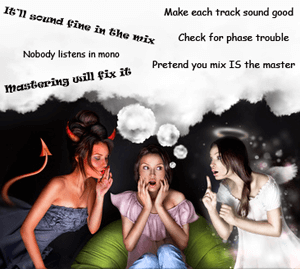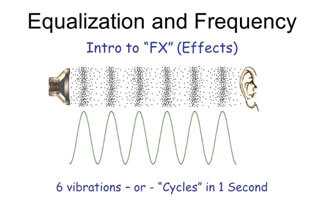 I recently read an article that has some tips on a few very common mindset traps you should avoid. As I read through them I realized that I have had them all at various times, and it never ends well.
I recently read an article that has some tips on a few very common mindset traps you should avoid. As I read through them I realized that I have had them all at various times, and it never ends well.
The first bad habit is to assume your tracks will sound better once they are mixed with the other tracks. Now I actually don’t think it’s 100 percent wrong all the time. But in general, you should make each individual track sound as good as possible and not count on the “bad” to be less noticeable when in a crowd with other sounds.
One exception that comes to mind though is how sometimes individual tracks, when soloed out of a mix, may not sound great on their own after you have applied EQ and other effects to individual instruments to allow them all to be heard in a mix. For example, it is not uncommon to scoop out a band of frequencies of an acoustic guitar to allow a piano to poke through the mix better. The parts of the guitar that sound good blended with the piano may be the high parts, and the piano may fill the middle frequencies to provide a balanced mix. But when soloed, the guitar might be missing a bunch of the middle frequencies that the piano is providing, making it sound too high and thin all by itself. In this case, the guitar really WOULD sound better in the mix. There are lots of examples like this all over the frequency spectrum. So keep that in mind when avoiding this particular bad habit.
The next one was to assume your mix will sound better when it’s mastered. While it might be true, you should never count on it. In fact just never think this way at all, ever. Just mix your songs as if your mix is what will be heard by the public. Then all you have to do is leave enough headroom for a mastering engineer to do his or her job to make it even better.
The last bad habit is the assume everyone will listen to you mix in stereo. The idea here is that when all your tracks are panned, they may sound great. But when “folded” to the center things might very well not play well with each other – with frequencies possibly cancelling each other out or combining to become too loud, or both. So it is often recommended that you test your mixes in mono to see if you have these phase problems. On the other hand, I think in this day and age, it is actually true that most folks will be listening in stereo. Also, I remember reading an article a few years ago in Recording Magazine by a producer who said he didn’t care (and his name was not “Honey Badger:)). He said if someone listens to his mix in mono and it sounds all whacked out, so much the better. It might be interesting to the person who dared not listen in stereo. Of course, I paraphrase.
Anyway, read Graham’s article about these three habits here: http://therecordingrevolution.com/2012/08/27/3-dangerous-assumptions-in-the-studio/
Archives for June 2016
Distortion Used During Mixdown
The word “distortion” sounds inherently bad. Even the definition of the word in the dictionary suggests it is some wrong version of something else:-P. But guitarists have been using it to create cool sounding electric tones for decades. So in the audio world, distortion can often add character and something interesting to your sound.
When mixing down your recordings, the use of subtle harmonic distortion (not the big fat distortion sound from guitar pedals) can lend some interesting character to your final audio.
Check out how you can benefit from harmonic distortion in this article from Audiofanzine: Click here for that post
Some Tips To Quickly Improve Your Audio With EQ
 Equalization, or “EQ” for short, is one thing that can really differentiate a beginner mix from an expert one. Part of the reason for this is that it SEEMS like such a difficult topic to wrap your head around if you are not an engineer or audio techie.
Equalization, or “EQ” for short, is one thing that can really differentiate a beginner mix from an expert one. Part of the reason for this is that it SEEMS like such a difficult topic to wrap your head around if you are not an engineer or audio techie.
But part of the reason for that is the same old issue of making fairly simple concepts appear overly complicated.
Folks with experience and some basic EQ knowledge understand exactly what they are trying to do before they reach for those EQ controls. When I first started, I didn’t have a specific objective in mind (like, say, stop the low guitar notes from covering up the bass guitar notes). I would just use a preset and if it sounded decent, I’d use it. No bueno. EQ is a powerful tool and can mess things up if you don’t know some things.
But those things are not that difficult. For a quick primer on what EQ is, see my video (an excerpt from The Newbies Guide To Audio Recording Awesomeness) here:
That should help a lot. Then you can get some great tips from Graham over at Recording Revolution at the following link:
Click here to read more…
Review For Toontrack EZX Traditional Country
A great acoustic unit that works for nation, country, and acoustic music is a precarious inquire. Matthew Mann wears a stetson for EZX gathering. Read here for more info…
Home Studio Defined
Since recording in such a studio is restrictively costly for most performers, you might need to consider more moderate choices for the present — like setting up a home studio. Click here to read more…